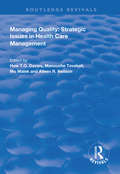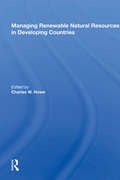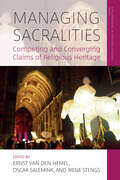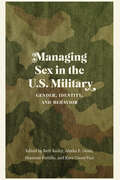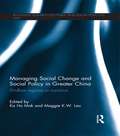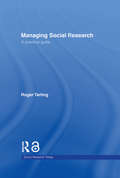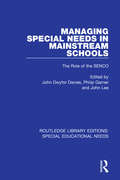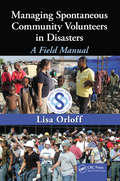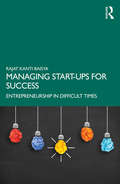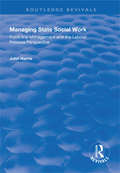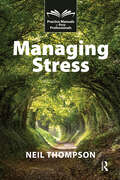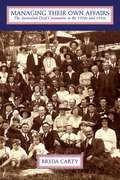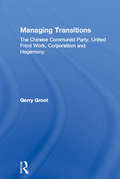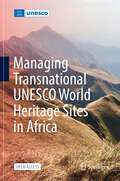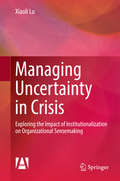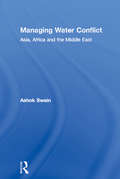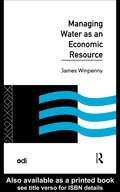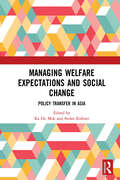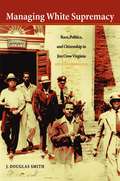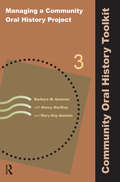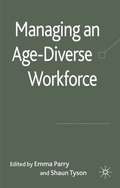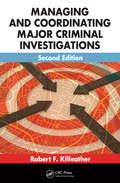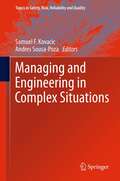- Table View
- List View
Managing Quality: Strategic Issues in Health Care Management (Routledge Revivals)
by Mo Malek Manouche Tavakoli Huw T.O. Davies Aileen R. NeilsonFirst published in 1999, this eclectic collection of papers examines quality management in health care from a variety of standpoints. Managers, health care professionals and patients all have valid – but often differing – perspectives on the nature of quality, its creation and maintenance. This book explores these perspectives, beginning by asking such fundamental questions as ‘Is health care a business?’, ‘How should health services be designed?’ and ‘What is quality of care?’. Subsequent chapters then address the practicalities of measuring and improving health care quality. The chequered history of clinical audit is exposed in the UK (essentially the Plan-Do-Check-Act cycle familiar to quality improvement specialists), and lessons are drawn for managerial action needed to increase the impact of such activities. These lessons have wider relevance to all involved in promoting the principles of continuous quality improvement (CQI). In addition, exploration of the growing role of performance indicators raises important issues about their meaningfulness and instrumentality in effecting real change. Improving clinical quality is now at the top of the agenda for many health systems. This book reviews the challenges faced and the tools available to meet them. It should prove valuable to a wide range of health care stakeholders interested in broadening their understanding of this rapidly developing field.
Managing Renewable Natural Resources In Developing Countries
by Charles W. HoweMuch of the improvement in material living standards in the Third World is attributable to the exploitation of nonrenewable resources such as fossil fuels and metallic ores, and to the exploitation of renewable resource systems at rates that cannot be sustained. This state of affairs presents a serious problem for the future; just as may be the case for the developed regions, a long-term perspective shows clearly that Third World countries must return to a greater dependence on renewable resources while also avoiding irreversible degradation of renewable systems and learning to manage these systems more productively. The authors of this book examine major issues in the four main renewable resource sectors—fisheries, forestry, agriculture, and water—with emphasis on the problems and benefits attendant to various use patterns and management practices.
Managing Residential Care
by John BurtonManaging Residential Care puts forward suggestions for improving the development of residential care through better management. Extended examples and realistic case studies throughout demonstrate how managers can succeed and how sometimes the powerful forces of mismanagement can obstruct them.
Managing Sacralities: Competing and Converging Claims of Religious Heritage (Explorations in Heritage Studies #6)
by Ernst van den Hemel, Oscar Salemink, and Irene StengsWhat happens when religious sites, objects and practices become cultural heritage? What are —religious or secular—sources of expertise and authority that validate and regulate heritage sites, objects and practices? As cultural heritage becomes an increasingly popular and influential frame, these questions arise in diverse and challenging manners. The question who controls, manages, and frames religious heritage, and how, arises with particular urgency. Case studies from Denmark, the Netherlands, Poland, Portugal and the United Kingdom present an analysis of the paradoxes and challenges that arise when religious sites are transformed into heritage.
Managing Sex Offender Risk
by Tony Ward Hazel Kemshall Andrew Kendrick Donald Grubin Gill McivorBased on key research into assessment, treatment and recidivism, this book offers practical guidance on improving intervention techniques with sex offenders. The contributors explore the monitoring and surveillance strategies and cognitive-behavioural techniques currently used both in prison and in the community, and give clear directions for future practice. Providing a detailed overview of the typologies and characteristics of offenders, they suggest strategies for managing different kinds of offender, including children and young people who are sexually aggressive. The Sex Offenders Act and the Crime and Disorder Act emphasise the need for effective community management of the predatory paedophile. Reviewing the recent growth in multi-agency approaches to this challenge, the book discusses how police, prisons and social work departments can share information and collaborate effectively, and will be essential reading for probation officers, prison staff, social workers and anyone involved in the assessment and management of sex offenders.
Managing Sex in the U.S. Military: Gender, Identity, and Behavior (Studies in War, Society, and the Military)
by Beth Bailey Alesha E. Doan Kara Dixon Vuic Shannon PortilloThe U.S. military is a massive institution, and its policies on sex, gender, and sexuality have shaped the experiences of tens of millions of Americans, sometimes in life-altering fashion. The essays in Managing Sex in the U.S. Military examine historical and contemporary military policies and offer different perspectives on the broad question: &“How does the U.S. military attempt to manage sex?&” This collection focuses on the U.S. military&’s historical and contemporary attempts to manage sex—a term that is, in practice, slippery and indefinite, encompassing gender and gender identity, sexuality and sexual orientation, and sexual behaviors and practices, along with their outcomes. In each chapter, the authors analyze the military&’s evolving definitions of sex, sexuality, and gender, and the significance of those definitions to both the military and American society.
Managing Social Change and Social Policy in Greater China: Welfare Regimes in Transition (Routledge Research On Public and Social Policy in Asia)
by Ka Ho Mok Maggie K. W. LauEast Asia is at the heart of the global economic transformation, and the countries of the region are witnessing rapidly changing labour markets, alongside the pressure to cut production costs and lower taxes in order to become successful ‘competition states’. These changes have resulted in increased welfare demands which governments, organizations and agencies across the region have had to address. This book examines welfare regimes in the Greater China region, encompassing mainland China, Hong Kong, Macao and Taiwan. In so doing, it explores the ways in which the rapid growth and internationalisation of the economy across Greater China is presenting new social policy challenges that governments, social welfare organizations and agencies in the region are having to respond to. Rather than simply describing and categorising welfare systems, the contributors to this volume add to our understanding of how one of the major economic transformations of the contemporary era in East Asia is shaping welfare provision in the region. In turn, in this context of economic change, they examine the new strategies and measures that have been adopted in order to reduce the heavy burden on the state in terms of welfare provision, whilst also attempting to diversify funding and provision sources to meet the pressing welfare needs. Based upon extensive fieldwork by leading scholars of social policy, this book will appeal to students and scholars of Asian social policy, comparative development and social policy, social welfare and Chinese studies.
Managing Social Research: A Practical Guide (Social Research Today)
by Roger TarlingAn essential tool for those planning to undertake social research, this exceptional book tackles many of the specific concerns and issues that arise. A well structured text, it offers a comprehensive introduction to a range of important areas in project management, including: commissioning research preparing a tender or grant application risk and stakeholder analysis managing the field work and data analysis financial management ethics, confidentiality and copyright. This book provides a unique source of guidance for anyone seeking to commission, manage or carry out social research. It will especially benefit researchers working in a variety of different contexts, including those in academia, central or local government, 'quangos', public bodies or private consulting companies.
Managing Special Needs in Mainstream Schools: The Role of the SENCO (Routledge Library Editions: Special Educational Needs #14)
by John Lee Philip Garner John Dwyfor DaviesFirst published in 1998. The wide-ranging perspectives in this book will help key personnel in primary schools to manage the implantation of the 1993 Education Act and the Code of Practice on the Identification and Assessment of Special Educational Needs more effectively. Governors and headteachers comment on the management of resources and on interaction with parents and others outside the school. Researchers and academics provide an analysis of the impact and legal implications of the Code of Practice on primary schools. SENCOs offer insights into the development of whole-school and classroom practice, commenting on the practicalities of implementing the philosophy behind the Code of Practice.
Managing Spontaneous Community Volunteers in Disasters: A Field Manual
by Lisa OrloffWhile history has identified a need for improved coordination during emergencies, it has also demonstrated that community volunteers positively impact their neighborhoods during times of crisis. Laying out the rationale and process by which emergency managers, community leaders, and non-governmental aid organizations can effectively collaborate and
Managing Start-ups for Success: Entrepreneurship in Difficult Times
by Rajat Kanti BaisyaWorld economics and the industrial environment has recently created a fertile ground for the creation of new enterprises and start-ups. This book skilfully identifies the challenges of building a new business venture from an idea to a marketable product. It highlights • Robust methods for keeping up with innovation; • Designing new ways to grow, improve and market your product; and • Managing the changes in the business environment, market dynamics and other uncertainties. The volume is rich with examples and case studies of many small and large businesses. It further reflects on the business and entrepreneurship ecosystem, the challenges and opportunities in India, entrepreneurship and women, e-commerce, the new generation of entrepreneurs, and exit strategies for entrepreneurs. An essential guide for entrepreneurs and professionals working in business management and marketing communications, as well as scholars of business administration and financial sciences, this book by an industry expert offers many new and practiced approaches, examples and lessons for innovative thinking and breaking new ground in business.
Managing State Social Work: Front-Line Management and the Labour Process Perspective (Routledge Revivals)
by John HarrisPublished in 1998. The industrial model of the labour process developed by Braverman was applied to social work in the radical social work literature. The book engages in a more critical examination of the application of the labour process perspective to social work, with particular reference to front-line management in a local authority context. It begins with a review of the labour process literature which demonstrates the extent to which the independence of Braverman’s model on scientific management was undermined in the post-Braverman debate. The radical texts' orthodox Bravermanian approach to the social work labour process is considered. In those texts, the social work labour process is represented as having moved towards an industrial model which steadily encroached on the autonomy of front-line field social workers, through managers’ wresting of control over their work. The book advances an alternative model of the social work labour process which takes account of the distinctive features of social work, as a state-mediated, bureau-professional labour process. Findings from a small-scale case study of a social services department are presented. Data from the study are used to test the bureau-professional model of the social work labour process against the orthodox Bravermanian model. Developments in the social services department’s organizational structure are set out and the position of front-line managers is considered through an exploration of their identifications and commitments in relation to management and trade unionism. The data from their accounts support the bureau-professional model of the labour process and the position of front-line managers emerges as more ambiguous than the radical social work literature indicated. Front-line managers did not share global goals with senior management, nor were their interests merged straightforwardly with those of social workers.
Managing Stress (Practice Manuals for Busy Professionals)
by Neil ThompsonThe Managing Stress Practice Manual, 2nd ed, provides the ideal stress management tool for practitioners across the public sector and professionals at all levels in business and management.The modern world of work is highly pressurised, with stress levels affecting workers' health and little to no understanding of the roots of stress, making workers feel overwhelmed and lacking the confidence to do anything about it. This book takes a holistic look at stress, offering clear and practical guidance on how to manage pressure, how to prevent stress, what to do if stress arises and how to deal with the aftermath of stress. By taking a deeper look, this book provides the reader with a full understanding, taking the narrow focus away from the individual themselves, and thereby taking away the 'blame the victim' message that can add to stress.This latest edition features new content including: current pressures caused by Covid-19, stress related to job insecurity, financial stress and the cost of living crisis issues around neurodiversity. It explains complex ideas clearly and accessibly, including practical examples and exercises throughout, with a repertoire of strategies and sources of help that will be invaluable to practitioners and business professionals alike.
Managing Their Own Affairs: The Australian Deaf Community In The 1920s And 1930s
by Breda CartyManaging Their Own Affairs explores how Deaf organizations and institutions were forged in Australia during the early 20th century. During this period, deaf people challenged the authority of the dominant welfare organizations, or Deaf Societies, which were largely controlled by hearing people and run as charitable institutions. Breda Carty comprehensively documents the growth of the Australian Deaf community and Australian Deaf organizations for the first time. She focuses on both the political developments of the early 20th century and on the nature of the relationships between deaf and hearing people. During this time, deaf Australians aspired to manage their own affairs. They enjoyed some success by establishing “breakaways” from the Deaf Societies, and they also established an independent national organization, which was contested and ultimately suppressed by the Deaf Societies. These developments were influenced by wider social movements in Australian society, such as the mobilization of minority groups in their push for autonomy and equal rights. Although most of the breakaway Deaf organizations did not survive beyond the 1930s, they significantly affected the power structures and relationships between deaf and hearing people in Australia. The Australian Deaf community’s attempts to organize independently during these years have been largely erased from collective memory, making Carty’s examination a particularly important and necessary addition to the historical literature.
Managing Transitions: The Chinese Communist Party, United Front Work, Corporatism and Hegemony
by Gerry GrootManaging Transitions examines the history and roles of China's minor parties and groups (MPG's) in the Chinese Communist Party's (CCP) united front between the 1930's and 1990's using Antonio Gramsci's principles for the winning and maintaining of hegemony. Gramsci advocated a "war of position," the building of political alliances to isolate existing state powers and win consent for revolutionary rule and transform society. Economic reform is now creating new socio-economic groups and the CCP is adjusting the united front and the MPGs to co-opt their representatives and deliberately forestall the evolution of an autonomous civil society and middle class which could challenge CCP rule. This has resulted in a new and expanding role for the united front, the MPGs and organisations representing the new interest groups.
Managing Transnational UNESCO World Heritage sites in Africa
by Dodé Houehounha Edmond MoukalaThis open access book focuses on the management of transboundary UNESCO World Heritage sites in the Africa region. It highlights the region as a model of best practices on cross-border collaboration in view of enforcing the conservation of the site, engaging with local communities, and fighting against (in some cases) extremist groups inhabiting these sites. It also addresses the role of the World Heritage Convention in promoting transboundary cooperation and offers both an analysis and a list of priorities for improving the effective management of transboundary properties in sub-Saharan Africa defined. This book presents chapters from experts, site managers, technical and financial partners, academics, and representatives of the private sector from 20 African countries and 15 institutions involved in African heritage management. It provides an opportunity to share current and planned initiatives at the transboundary sites inscribed on the UNESCO World Heritage List, including the Maloti-Drakensberg Park (South Africa, Lesotho), W-Arly-Pendjari Complex (Benin, Burkina Faso, Niger), Sangha Trinational (Cameroon, Congo, Central African Republic), and Mosi-oa-Tunya / Victoria Falls (Zambia, Zimbabwe). The publication further discusses African sites that could eventually be proposed for extension or nomination to the UNESCO World Heritage List in collaboration with the local and indigenous communities. This book is suitable for heritage specialists and readers interested in cross-border collaborations.
Managing Uncertainty in Crisis
by Xiaoli LuThis book studies the variety of organizational strategies selected to cope with critical uncertainties during crises. This research formulates and applies an institutional sense-making model to explain the selection of strategies for coping with uncertainties during crises to answer the question why some organizations select a rule-based strategy to cope with uncertainties, whereas others pursue a more ad hoc-based strategy. It finds that the level of institutionalization does not affect strategy selection in the initial phase of responding to crises; that three rigidity effects can be identified in the selection of sense-making strategies once organizations have faced the failure of their selected strategies; that discontinuities in the feedback loop of sense-making do not necessarily move organizations to switch their sense-making strategies, but interact with institutionalization to contribute to switching sense-making strategies. This book bridges the gap between institutional thinking and crisis management theorizing. A major step forward in the world of crisis management studies! ----Professor Arjen Boin, Leiden University, the Netherlands In a world of increasingly complex, sociotechnical systems interacting in high-risk environments, Professor Lu's analysis of how organizations manage uncertainty is both timely and profound. ----Professor Louise K. Comfort, Director, Center for Disaster Management, University of Pittsburgh, USA Prof. Lu greatly enhances our understanding of how organizations cope with uncertainty and make sense of their challenges under the pressures of catastrophe. ----Dr. Arnold M. Howitt, Faculty Co-Director, Program on Crisis Leadership, Harvard Kennedy School, USA This book provides not only a theory of crisis management but also a key concept around which research and practice can be conducted. ----Professor Naim Kapucu, Director of School of Public Administration, University of Central Florida, USA A generic institutional model for analyzing and managing hazards, disasters and crises worldwide. ----Professor Joop Koppenjan, Erasmus University Rotterdam, the Netherlands This book has done an excellent job in opening the black box of how organizations make sense of the crisis situations they face and develop strategies to respond. It should be read by all of us who wish for a peaceful and safe world. ----Professor Lan Xue, Dean of School of Public Policy and Management, Tsinghua University, China
Managing Water Conflict: Asia, Africa and the Middle East
by Ashok SwainCountries are meeting increasing water demand by building reservoirs and by diverting water from one area to another. When the water belongs to an international river system, these measures lead to riparian conflicts. However, water scarcity not only brings conflict to these regions, but also plays its part in building cooperation.In several international river basins in Asia, Africa and the Middle East, competing and disputing riparian countries are now moving towards a co-operative sharing arrangement. The signs of agreements on water sharing may be easy, but the real problem is how to keep these arrangements on track. Such agreements can positively contribute to peace and cooperation by addressing future needs, making sustainable decisions and being progressive in their management. Managing Water Conflict looks at these current stresses and likely future scenarios for this vitally important subject.
Managing Water as an Economic Resource (Development Policy Studies Series)
by James WinpennyWater, already a scarce resource, is treated as though it were plentiful and free. The task of supplying enough water of the required quality to growing populations is straining authorities and governments to the limit as the economic and environmental costs of new supply sources escalate and wasteful supply, delivery and consumption systems persist. Managing Water as an Economic Resource argues that the root of the crisis is the failure of suppliers and consumers to treat water as a scarce commodity with an economic value. James Winpenny evaluates policies for the improved management of existing demand, and draws on case studies from different countries as he discusses how policies could be implemented to treat water as an economic good conferring major economic, financial and environmental benefits.
Managing Welfare Expectations and Social Change: Policy Transfer in Asia
by Ka Ho Mok Stefan KühnerMuch has been written about the challenges Asian governments face in response to rapid socio-economic changes and the resulting social needs and welfare expectations. Indeed, heated debates have emerged when scholars in social development, social welfare and social policy conducted more systematic comparative research related to the diverse policy measures adopted by Asian governments: which welfare models or typologies best describe Asian cases after the 2008 global financial crisis?; how can contemporary social policy transformations in Asia be appropriately conceptualized?; are particular ‘best practice’ examples evolving in Asia and if so, can they be successfully transferred to enhance social welfare governance among Asian economies? This book combines contributions that address Asian government responses in the light of the above questions. In doing so, it revisits the broad theoretical literature on "policy transfer" and provides empirical examples to explore the spread of ideas, social policies and programmes across Asia from varying analytical and methodological perspectives. The chapters originally published as a special issue in the Journal of Asian Public Policy.
Managing White Supremacy
by J. Douglas SmithTracing the erosion of white elite paternalism in Jim Crow Virginia, Douglas Smith reveals a surprising fluidity in southern racial politics in the decades between World War I and the Supreme Court's 1954 Brown v. Board of Education decision.Smith draws on official records, private correspondence, and letters to newspapers from otherwise anonymous Virginians to capture a wide and varied range of black and white voices. African Americans emerge as central characters in the narrative, as Smith chronicles their efforts to obtain access to public schools and libraries, protection under the law, and the equitable distribution of municipal resources. This acceleration of black resistance to white supremacy in the years before World War II precipitated a crisis of confidence among white Virginians, who, despite their overwhelming electoral dominance, felt increasingly insecure about their ability to manage the color line on their own terms. Exploring the everyday power struggles that accompanied the erosion of white authority in the political, economic, and educational arenas, Smith uncovers the seeds of white Virginians' resistance to civil rights activism in the second half of the twentieth century.
Managing a Community Oral History Project (Community Oral History Toolkit #3)
by Nancy MacKay Barbara W Sommer Mary Kay QuinlanThe third book in the five-volume Community Oral History Toolkit takes the planning steps outlined in Volume 2 and puts them into action. It provides the practical details for turning your plans into reality and establishes the basis for guiding your project through the interviews to a successful conclusion. Project managers are given concrete, useful advise on how to manage people, money, technology, publicity, and administrative tasks from the beginning to the end of the project. Volume 3 outlines details for developing the necessary forms to properly administer a community oral history project (sample forms provided). The authors advise how to recruit volunteers and interviewees and provide helpful tips for conducting thorough interview and transcription training sessions and how to make arrangements for the life and safety of the project one the interviews are complete.
Managing an Age Diverse Workforce
by Emma Parry Shaun Tyson.Unique in the multiple approaches that it encompasses, this book includes discussions of both older and younger workers, employer and employee perspectives, generational and age diversity and international comparisons. It includes both conceptual argument and empirical research in order to provide insights into this important area.
Managing and Coordinating Major Criminal Investigations
by Robert F. Kilfeather Jr. Robert P.The process of controlling criminal investigations is a complex matter, yet it has frequently been minimized or neglected in police management publications. But knowing how to properly plan for an event, make resource agreements with other participants in the investigation, and implement a coordinating system within the agency is critical to proper
Managing and Engineering in Complex Situations
by Samuel F. Kovacic Andres Sousa-PozaWith so many terms available to define the same thing, it would seem nearly irresponsible to introduce yet another term (complex situation) to describe a phenomenological state of such as a system. However, a complex situation infers both a broader meaning and imposes a different perspective. Complex in this context is dependent on understanding and reality rather than observer and knowledge. Situation imposes a gestalt that cannot be characterized within a singular perspective that relegates paradox to a superior/subordinate hierarchy. This also infers that complex situation has no monotonic definition or each definition is by default incomplete. Therefore the perennial derivations for systems such as complex systems, system of systems, federation of systems is no longer a sufficient descriptor for complex situation. Ergo system and its genealogy lack the constitution to define complex situations. The books' intent is to explore this pathology through a series of papers written by authors that work in complex situations and have dealt with the limitations of the status quo: systems.
